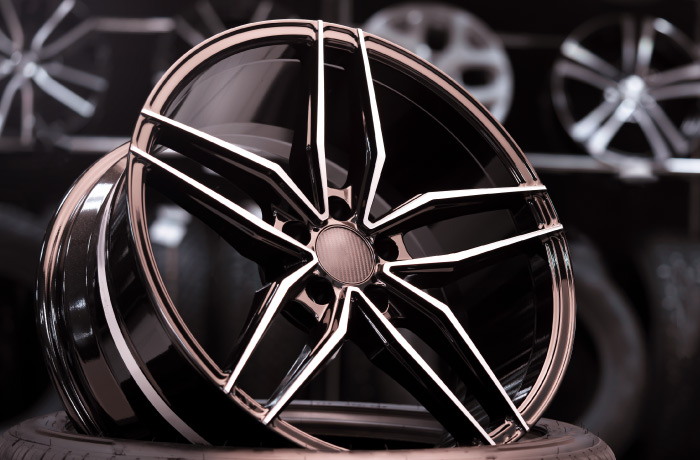Alloy wheels and the steel wheels form the two basic and widely preferred wheel types in the automotive industry.
Whether it is an alloy wheel or a steel wheel, each one has a different set of conditions on their preference for the desired wheel type. The modern alloy wheels and the conventional steel wheel types not only vary in their pricing structure but range from the basic composition to several specifications.
The industry today has different types of car wheels in production. But earlier, not much thought was put into the look and aesthetics of a wheel, and the most basic vehicles had the steel wheels. With modernisation and the consumer’s changing demand, we see the growth of the different types of wheels.
A common concern that we all face is selecting the right type of wheel for our vehicle. Both wheel types have their set of pros and cons. While one would be better in terms of aesthetics, the other type dominates on durability and strength. The dilemma only increases as we dive further into details. What if we said that there was a solution to this problem!
What Are Steel Wheels?
Steelies are the most basic form of wheels used in the industry back from the time wheels have been on the road. Steel wheel’s composition is similar to the primary steel- alloy of iron and carbon. The modern steel wheel versions have come a long way as improvements from the first wheels that were produced. The different steel wheels made moulded today are based on the vehicle’s specification for strength and tasteful requirement.
Contrary to the general assumption of the wheel’s structure, your car wheel is not just one single piece of metal. Instead, it comprises the hub, spokes and the rim, that is the outermost portion of the wheel.
The production of steel wheels involves the various steps in which first, the steel billets are pressed together using powerful hydraulic equipment. The centrepiece wheel (with specific design for hub and spokes) and rim are separately made and then welded into one piece, followed by the final polishing and coating for the glossy finish.
This wheel type had market domination until the alloy wheels, and other modern, artistic variants came into the picture.
What Are Alloy Wheels?
Although alloy is a common term and can also be used for the steel type (an alloy of carbon and iron), the Alloy Wheels in industry terminology refers to the nonferrous alloys only.
These started as magnesium alloy wheels and then gradually evolved through the aluminium versions. There was a period in time when these alloy wheels were reserved solely for the models that had the uppermost specced slots in the manufacturer’s range. Through all the years, today, alloy wheels have come a long way from a rarity to be present in a regular city hatchback model. Manufacturers in the industry have come up with several ranges of this wheel type based on the requirement by mixing different compositions of aluminium or magnesium metal mixed with nickel. This alloy composition makes for the lighter weight of the wheels, which in turn contributes to the vehicle’s lighter unsprung mass.
Which Is Better Alloy or Steel Wheels?
Several distinguishing features separate the alloy and steel wheels. These include their production process, their features like pricing, durability, strength, weight, etc. Not all of us want the same specifications or desire exactly similar features for our cars.
While some look for the wheel’s design and maintenance feature, others would prefer the differential price benefit or repairability benefit. Your exact requirement and the features that you desire will determine the final choice of your wheel type selection.
You can select your final requirement based on the following distinguishing features of both the wheel types:
1. Pricing
Are alloy wheels more expensive than steel?
Yes, alloy wheels price is more than steel wheels price. When it comes to alloy wheels price, their manufacturing, repair and buying price are more than the steel counterparts. Steel wheels can be your preferred choice if you’re looking for a cheap and durable option.
2. Durability
The lightweight of alloy wheels makes them susceptible to a crack or fracture when confronted with a heavier force. When faced with a more massive force than their strength, the steel wheels only bend, and this makes them a preferred choice in terms of durability and repairability.
3. Strength
As compared to the alloy counterparts, the steel wheels are popular for their strength. Alloy wheels have aluminium as a primary metal which provides for their lighter weight. Addition of nickel, titanium or magnesium metals provides for their strength, allowing them to take a heavier braking load.
4. Design
Alloy wheels are known for their aesthetic properties. Steel wheels are single piece metals that limits them to the designs added only in the initial forms during manufacture.
The malleable property of the alloy wheels allows the manufacturer the desired freedom of design. By reducing the nickel amount with the alloy, vast opportunities open up for the car model’s aesthetics variations.
5. Weight
Steel wheels are known for their heavyweight structure. The heavyweight of these wheels is helpful in different situations like on a snow-covered road where the strength and weight of the steel help the driver to manoeuvre through the blockage.
Whereas, for alloy wheels, their light upspring mass makes for the driver’s improved handling experience on the road as the suspension gets an efficient control over the undulating road surfaces. This lightweight of the alloy wheels is the reason why we witnessed the performance vehicles shifting their wheel preference to the alloy type.
The lightweight property of alloy wheels and dissipating heat faster than steel wheels provide the drivers with a better grip and traction, for good performance on the road.
The ultimate solution to the question will vary based on the different user’s requirements. But when it comes to getting your car serviced, go for the best!
Carcility is your complete hassle-free car care solution provider. From getting all the car care queries resolved to have the complete hassle-free service from the best workshops in the region – visit our website and witness the zero hassle for yourself. Sit back and get instant, fair and transparent quotes for your service request. Live track the service status and get discounts from the several offers running on the website. Download the app, and witness the hassle-free care for yourself.
We can, with Carcility!







